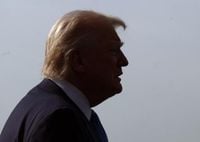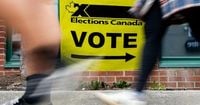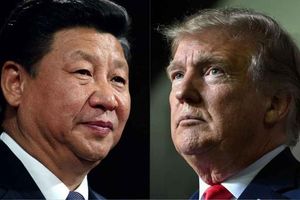As voters in Canada head to the polls on April 28, 2025, U.S. President Donald Trump has once again stirred controversy by suggesting that Canada should consider becoming the "cherished" 51st state of the United States. Posting on his Truth Social platform, Trump expressed his hopes for the Canadian electorate, stating, "Good luck to the Great people of Canada." He urged them to elect a prime minister who possesses the "strength and wisdom" to significantly cut taxes and boost military power while expanding business opportunities.
In his message, Trump elaborated on his vision for Canada if it were to join the U.S. He claimed that under such a scenario, Canadians could see their taxes halved, military capabilities enhanced to the highest levels globally, and a quadrupling of the size of various industries including automotive, steel, aluminum, lumber, and energy. He emphasized that this could all be achieved "WITH ZERO TARIFFS OR TAXES" if Canada were to become a state. Trump’s rhetoric included a bold assertion that the current border between the two nations is merely an "artificially drawn line" and that eliminating it would create a more unified and prosperous landmass.
Trump's comments come against a backdrop of strained U.S.-Canada relations, exacerbated by his aggressive tariff policies and previous remarks about Canadian sovereignty. His proclamation that the U.S. can no longer subsidize Canada with "hundreds of billions of dollars" annually has drawn sharp rebukes from Canadian leaders.
In response to Trump's remarks, Conservative Leader Pierre Poilievre took to social media to assert that Trump should "stay out of our election." Poilievre emphasized that the future of Canada is a decision solely for Canadians, stating, "Canada will always be proud, sovereign and independent and we will NEVER be the 51st state." He urged voters to choose a path that would strengthen Canada’s autonomy and position in the world.
The election campaign in Canada has been heavily influenced by Trump's rhetoric. Prime Minister Mark Carney of the Liberal Party, who has been trailing in polls, has seen a resurgence in support by campaigning against Trump's approach. Recent predictions from Polymarket suggest that Carney has more than an 80 percent chance of retaining his position as Prime Minister following the election.
While it remains unclear which candidate Trump was specifically referencing in his post, both Carney and Poilievre have consistently rejected any notion of Canada becoming a U.S. state. Carney’s platform includes a pledge to reduce the marginal tax rate for the lowest income bracket and increase defense spending. Meanwhile, Poilievre proposes a 15 percent cut in income tax and also advocates for increased military funding. However, neither candidate's proposals align with Trump's grandiose claims of halving taxes and enhancing military strength at no cost.
This isn’t the first time Trump has questioned the legitimacy of the Canadian border. Earlier in March, he referred to the boundary as "an artificial map, drawn by some guy with a ruler years ago," suggesting that the border could be dissolved. His previous statements about having productive conversations with Carney have also fueled speculation about the future of U.S.-Canada relations.
During a phone call with Carney in March, Trump described their discussion as "extremely productive," expressing optimism about future cooperation on various fronts including politics and business. Carney, for his part, has stated that Canada is ready to engage with the U.S. on comprehensive negotiations, but only when Canada is treated with respect as a sovereign nation.
As the election results begin to roll in on the evening of April 28, with polls closing in Newfoundland and Labrador at 7 p.m. ET, the implications of Trump's comments may resonate well beyond the ballot box. Initial results are expected to be reported throughout the night and into the morning of April 29.
In the lead-up to the election, both Carney and Poilievre have reiterated their commitment to Canadian sovereignty. Carney emphasized the need for respect in negotiations with the U.S., while Poilievre has vowed to protect Canada’s independence, stating, "We will bear any burden and pay any price to protect the sovereignty and independence of our country."
As Canada stands at a crossroads, the outcome of this election could redefine not only the nation’s political landscape but also its relationship with its southern neighbor. With Trump’s provocative statements still fresh in the minds of voters, the stakes have never been higher for Canada as it seeks to assert its identity and autonomy on the world stage.





